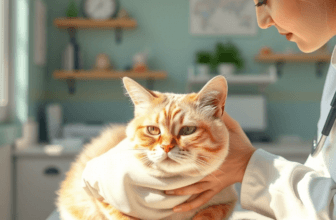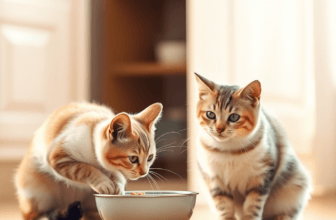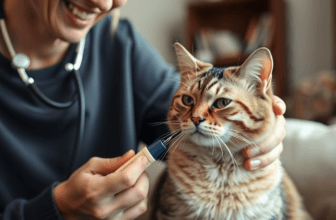
Table of Contents
As cats age, their dental health becomes a critical aspect of their overall well-being. Dental problems in senior cats are common and, if left untreated, can lead to severe pain, difficulty eating, and even systemic health issues. Understanding the causes, symptoms, prevention strategies, and treatment options can help cat owners ensure their feline companions live a comfortable and healthy life.

Understanding Dental Problems in Senior Cats
Common Dental Issues in Aging Cats
Senior cats are prone to various dental diseases, including:
| Dental Problem | Description | Symptoms |
|---|---|---|
| Periodontal Disease | A bacterial infection affecting the structures surrounding the teeth. It is the most common dental issue in senior cats. | Bad breath, inflamed gums, drooling, difficulty eating |
| Tooth Resorption | A painful condition where a cat’s tooth structure breaks down and is absorbed by the body. | Excessive drooling, difficulty eating, oral bleeding |
| Gingivitis | Inflammation of the gums due to plaque and bacteria accumulation. | Red, swollen gums, bad breath, reluctance to eat |
| Stomatitis | A severe inflammation of the mouth and gums, often requiring medical intervention. | Ulcers in the mouth, excessive drooling, extreme pain |
| Broken or Fractured Teeth | Can result from trauma or chewing hard objects, leading to pain and infection. | Sudden food aversion, pawing at the mouth, bleeding |
Causes of Dental Issues in Senior Cats
Several factors contribute to dental problems in aging felines:
- Plaque and Tartar Buildup: Accumulation of bacteria and food debris hardens into tartar, leading to infections.
- Weakened Immune System: Older cats have a reduced ability to fight off infections, increasing the risk of gum disease.
- Dietary Factors: Soft food diets may contribute to plaque accumulation.
- Lack of Dental Care: Without regular brushing or professional cleanings, dental issues progress rapidly.
- Genetics: Some breeds, like Siamese and Persian cats, are more predisposed to dental diseases.
Prevention Strategies for Dental Health in Senior Cats
Daily Dental Care
- Brushing Your Cat’s Teeth: Use cat-specific toothpaste and a soft-bristled brush. Introduce brushing gradually to avoid stress.
- Dental Wipes and Rinses: If brushing is not possible, dental wipes or chlorhexidine-based rinses can help reduce plaque.
- Water Additives: These can help maintain oral hygiene by reducing bacteria in the mouth.
Nutritional Considerations
- Dry vs. Wet Food: Special dental diets formulated to reduce plaque and tartar can be beneficial.
- Dental Treats and Chews: Some treats are designed to help clean teeth mechanically.
- Adding Supplements: Enzymatic supplements can aid in preventing plaque buildup.
Regular Veterinary Check-ups
- Annual Dental Exams: Veterinarians can detect early signs of dental disease.
- Professional Dental Cleanings: Performed under anesthesia to remove tartar and address any underlying issues.
- X-rays and Oral Assessments: Help detect hidden dental problems such as resorptive lesions.
Recognizing Signs of Dental Disease in Senior Cats
Symptoms to Watch For
| Symptom | Possible Dental Issue |
| Bad breath | Periodontal disease, gingivitis |
| Drooling excessively | Stomatitis, tooth resorption |
| Difficulty eating | Painful teeth or inflamed gums |
| Weight loss | Avoiding food due to dental pain |
| Pawing at the mouth | Toothache, fractured teeth |
| Red or bleeding gums | Gingivitis, stomatitis |
If any of these signs are present, seek veterinary care promptly to prevent further complications.
Treatment Options for Dental Problems in Senior Cats
Home Care Management
- Pain Management: Veterinarians may prescribe pain relievers or anti-inflammatory medications.
- Soft Food Diet: Switching to soft or moistened food can make eating easier for cats with dental pain.
- Antibiotic Therapy: If an infection is present, antibiotics can help reduce inflammation and pain.
Professional Veterinary Treatment
- Dental Scaling and Cleaning: Removes tartar and plaque buildup under anesthesia.
- Tooth Extractions: Necessary for severely damaged or infected teeth.
- Laser Therapy: Some veterinarians use laser treatments to reduce oral inflammation.
Long-Term Oral Health Maintenance for Senior Cats

Developing a Routine
- Start Early: Even if your cat is a senior, establishing a dental care routine is still beneficial.
- Consistency is Key: Daily brushing or using alternative dental hygiene methods will help prevent severe dental diseases.
- Monitor for Changes: Keep an eye on your cat’s eating habits and oral health.
Integrating Dental Care into Your Cat’s Lifestyle
- Provide Dental Toys: Specially designed toys can help reduce plaque.
- Use Oral Hygiene Sprays: These can freshen breath and reduce bacteria.
- Encourage Hydration: Water helps flush out bacteria and keeps gums healthy.
Conclusion
Dental problems in senior cats are a significant concern that requires proactive prevention and proper care. By understanding common dental diseases, implementing a daily oral care routine, and seeking regular veterinary check-ups, cat owners can help their feline companions enjoy a pain-free and healthy life. If you notice any signs of dental disease, seeking immediate veterinary attention can prevent further complications. With the right approach, maintaining your senior cat’s dental health can be manageable and rewarding.
FAQ: Dental Problems in Senior Cats – Prevention & Care
What are the most common dental problems in senior cats?
Senior cats are prone to:
– Periodontal disease: Inflammation and infection of the gums and tooth-supporting structures.
– Tooth resorption: A painful condition where the tooth structure breaks down.
– Gingivitis: Inflammation of the gums, often leading to more serious dental diseases.
– Stomatitis: A severe, painful inflammation of the entire mouth.
How can I tell if my senior cat has dental problems?
Signs of dental issues include:
– Bad breath (halitosis)
– Difficulty eating or dropping food
– Pawing at the mouth
– Excessive drooling
– Bleeding gums or visible tartar buildup
– Weight loss due to eating difficulties
How can I prevent dental problems in my senior cat?
– Daily brushing: Use a cat-safe toothpaste and a soft toothbrush.
– Regular dental checkups: Annual or bi-annual vet visits can catch problems early.
– Dental diets & treats: Special kibble or chews can help reduce plaque buildup.
– Water additives: Dental rinses or additives in water can support oral hygiene.
What should I do if my senior cat has a dental issue?
– See a vet promptly: Delayed treatment can lead to infections and pain.
– Professional dental cleaning: Your vet may recommend a cleaning under anesthesia.
– Pain management & antibiotics: If infection or pain is present, medications may be needed.
– Tooth extraction: In severe cases, removing damaged teeth may be the best option.
Can dental problems affect my senior cat’s overall health?
Yes! Poor dental health can lead to:
– Chronic pain affecting appetite and quality of life.
– Infections spreading to vital organs like the heart and kidneys.
– Weight loss & malnutrition due to difficulty eating.
Sources
- American Veterinary Dental College: https://www.avdc.org
- Cornell University Feline Health Center: https://www.vet.cornell.edu/departments-centers-and-institutes/cornell-feline-health-center
- American Association of Feline Practitioners (AAFP) Dental Guidelines: https://catvets.com/guidelines/dental-care
- ASPCA Cat Dental Care Guide: https://www.aspca.org/pet-care/cat-care/dental-care
- International Society of Feline Medicine (ISFM) Dental Health Resources: https://icatcare.org/advice/dental-care








[…] Dental problems are one of the most common reasons for drooling in cats. Conditions like gingivitis, periodontal disease, or tooth abscesses can cause pain and inflammation, leading to excessive drooling. Cats are also prone to oral tumors, which can irritate the mouth and trigger drooling. […]
[…] compulsion to eat non-food items. This can sometimes be related to nutritional deficiencies, dental problems, or gastrointestinal issues. If your cat is actually ingesting significant amounts of cardboard […]